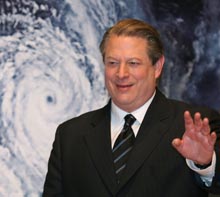Think of this as Volume 12, Number 46 of A-Clue.com, the online newsletter I've written since 1997. Enjoy.

In a campaign you have a platform. That platform includes many different parts. They are an integrated whole.
But once you start governing you have to separate the pieces. Anything requiring Congressional action must be passed separately. Thus Presidents are told to concentrate on doing just one big thing.
A great economic plan, jammed through Congress by a narrow majority, has been the instrument of choice for a generation now. Reagan used it, Clinton used it, Bush used it. This set the table for everything else they did, or tried to do.
This was not possible with President Obama. There were just too many things that have to be done. His stimulus plan, while massive, only turned the nose of the airplane up and kept it from crashing to the ground. It was not what he was about, not what we voted him in for.
The actual Obama program consists of two other pieces of legislation. Call them the labor bill and the jobs bill.

The aim of health reform was to base what is covered on sound science and statistics (it was called comparable effectiveness), then to provide a level playing field on costs by making everyone pay into a larger system.
The dumbest move the President has made to date was made early. That was, during the debate on the stimulus, to drop comparable effectiveness. (This was made "necessary" by idiot assholes like Betsy McCaughey (above), who should rot in hell.)
Without statistics backing best practices, decisions on what to cover and how become political, a mirror of the present state system. The significance of the Stupak Amendment was not what it did about abortion, but how it emphasized this simple fact, that the system was not going to change in any fundamental way, and that there was no real way to control costs.
So the labor bill is sitting before the Senate, and it doesn't do what it was designed to do. All it does now is regulate the market for buying insurance, perhaps adding a plan from the government, perhaps not. And it doesn't matter. You can't give businesses visibility on their labor costs until you get costs under control, you can't do that unless you take politics out of the medical process, and you can't do that until you are basing decisions on data. Saying "we'll collect the data but not do anything with it" is ridiculous. When one-third of all procedures being done are either worthless or not justified, and you maintain a political system that protects those procedures, you're not doing anything that gives businesses the confidence to hire.
So the labor bill is fucked. Now we come to the jobs bill.

The climate bill was the jobs bill, but it wasn't sold as a jobs bill. It was sold as a climate bill. It was sold with Al Gore as its spokesman. So people perceived it as a left vs. right struggle, and all the global warming denialists came out of the woodwork.
This bill has nothing to do with global warming. It has to do with aligning our market incentives toward growth, toward jobs. Oil and gas aren't adding jobs. Coal is not adding jobs. Certainly not any jobs you want your kids doing. Solar, wind, ammonia, tides, geothermal, the smart grid — those are jobs worth doing. Research jobs, blue collar jobs, white collar jobs, even finance jobs for masters of the universe. Opportunities for all kinds of entrepreneurs to make a killing, and compete on a growing global market.
Right now we're getting killed in that market. Germany is getting almost 20% of all its electricity from the Sun. Germany's climate is like that of Seattle grafted onto Ohio. It's gray, often dreary, it's variable. Sometimes the Sun is on, more often the Sun is off. And they're beating us in the new market.
China provided incentives for solar cell production, and they're even beating Germany. They're beating the stuffing out of us. We need to stop subsidizing the markets that don't grow, and start subsidizing those which do. And the best way to do that is to simply start charging those older markets for the externalities they generate — pollution, carbon emissions, smog. To make it easier create a market for that pollution, so you can dial it down, and dial up incentives for the new industry.
It's a jobs bill.
So the labor bill has been neutered and the jobs bill is going nowhere, because we're doing this piece work. The President needs to bring the American people in on this and explain how they're all connected — the stimulus, the labor bill, the jobs bill — and then whip the Senate into backing him, because he's the President. Screw this so-called 60-vote requirement. Ronald Reagan didn't need it, Bill Clinton didn't need it, and neither did George W. Effing Bush.
It's time for the President to lead, to push his program as an integrated whole, or else America is going down, the Democrats are going down, and we better all move to Canada because that's going to be the only place to feel a cool breeze.










